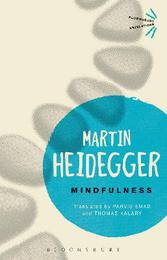
|
Mindfulness
Paperback / softback
Main Details
Description
Written in 1938/9, Mindfulness (translated from the German Besinnung) is Martin Heidegger's second major being-historical treatise. Here, Heidegger develops some of his key concepts and themes including truth, nothingness, enownment, art and Be-ing and discusses the Greeks, Nietzsche and Hegel at length. In addition to the main text, the text also includes two further important essays, 'A Retrospective Look at the Pathway' (1937/8) and 'The Wish and the Will (On Preserving What is Attempted)' (1937/8), in which Heidegger surveys his unpublished works and discusses his relationship to Catholic and Protestant Christianity and reflects on his life's path. This is a major translation of a key text from one of the most important thinkers of the 20th century, now available in the Bloomsbury Revelations Series.
Author Biography
Martin Heidegger (1889-1976) is regarded as one of the 20th century's most important philosophers. Successor to Edmund Husserl as Professor of Philosophy at the University of Freiburg, Germany, his major work is the influential Being and Time.
ReviewsThis is a central text for coming to terms with Heidegger's thinking ... The translation itself mirrors and maintains the haunting character of the German text. The Translators' Foreword is a masterpiece in setting the stage and opening up the possibilities for the English to stay true to the Heideggerian project of thinking the truth of be-ing. * Kenneth Maly, University of Wisconsin, USA *
|